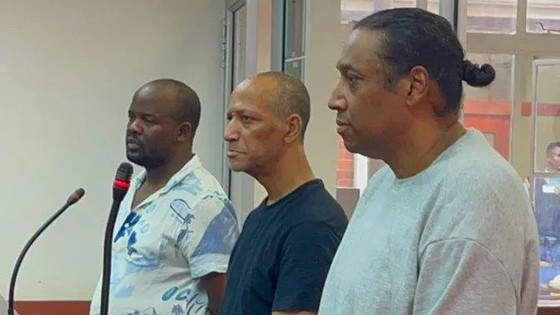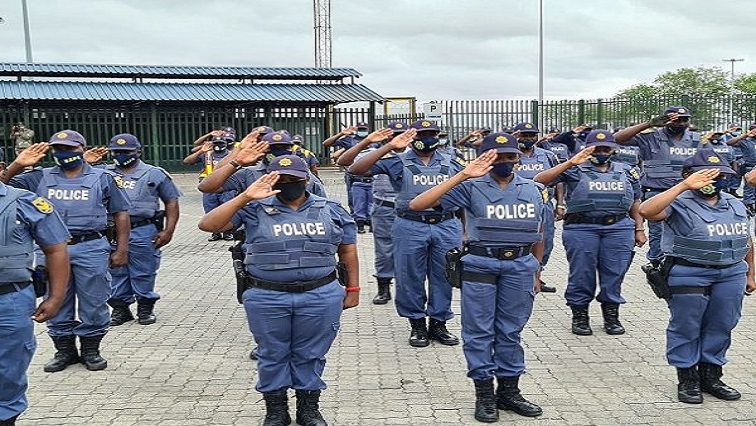A South African police officer, Samkeliso Honest Mlotshwa, found himself in court this week, facing serious charges in connection with the kidnapping of a KwaZulu-Natal businessman, Zakariyya Desai. Mlotshwa appeared alongside two Mozambican nationals, Esmael Nangy and Stefan Brites, at the KwaDukuza Magistrate’s Court on Tuesday to apply for bail. The trio was arrested in November 2024 after a harrowing sequence of events that began in September when Desai, owner of Desai’s Cash & Carry, was abducted outside a mosque in KwaZulu-Natal. Suspects in a silver VW Polo forcibly took Desai, firing several shots in the process as onlookers tried to intervene. Desai has been missing since that night, and the KwaZulu-Natal Hawks have been relentlessly pursuing leads across the country in an effort to locate him.
The details surrounding the kidnapping are chilling, with the suspects displaying a clear disregard for human life and safety. Desai’s abduction occurred after a night prayer, a time when many in the community were left vulnerable to such violent acts. The police have not yet provided specifics on Desai’s whereabouts, but the relentless pursuit by the Hawks underscores the importance of bringing those responsible to justice. The involvement of a police officer in such a heinous crime has added a layer of complexity to the case, raising questions about the integrity of those sworn to protect the public.

Nangy, a Mozambican national, has been particularly linked to a wider network of criminal activity. Having been arrested previously in January 2023 in Centurion, Gauteng, Nangy was known to law enforcement for his role in a series of abductions and ransom demands linked to his home country. His arrest followed an Interpol request for his capture, which was initiated by the Mozambican government. At the time of his arrest, Nangy was found in possession of a 9mm firearm, multiple bank cards, several cellphones, and various SIM cards from both South Africa and Mozambique. Despite being denied bail at that time, questions remain regarding his extradition and subsequent release, casting further doubt on the handling of his case.
Meanwhile, another Mozambican national, Moses Sithole, faced charges of human trafficking and immigration violations after his arrest in December 2024. Sithole’s case came to light following a tip-off about a 17-year-old girl being held captive at his residence in Vanrhynsdorp, Western Cape. The victim, allegedly trafficked from Mozambique two years ago, was rescued by a multidisciplinary team that included the Hawks, Crime Intelligence, and the South African Police Service (SAPS). The girl was given medical attention and moved to a place of safety after the team entered the premises and freed her from captivity. Sithole was charged and appeared in court on December 9, 2024, but his case was postponed due to the need for an interpreter.
This case highlights the ongoing and deeply concerning issue of human trafficking in South Africa, with Mozambique serving as a key origin country for many of the victims. The Hawks’ investigation into Sithole’s activities, as well as their intervention to rescue the girl, demonstrate the increasing sophistication of criminal networks operating across borders. South Africa has become a significant transit point for human trafficking, with the country’s porous borders often exploited by criminals to move victims into various forms of exploitation. The case underscores the importance of continued collaboration between law enforcement agencies, both locally and internationally, to combat these organized crime syndicates.
As the investigation into Desai’s kidnapping and the trafficking case involving Sithole continue to unfold, it is clear that these cases are part of a broader pattern of cross-border crime that is increasingly challenging law enforcement. The involvement of police officers in such serious criminal activity is particularly alarming, signaling a need for further scrutiny and reform within the SAPS to ensure public trust is maintained. Both cases reflect the serious threat posed by international criminal syndicates operating within South Africa and the urgent need for a coordinated response from local authorities, national agencies, and international partners to dismantle these networks and protect vulnerable citizens from further harm.
